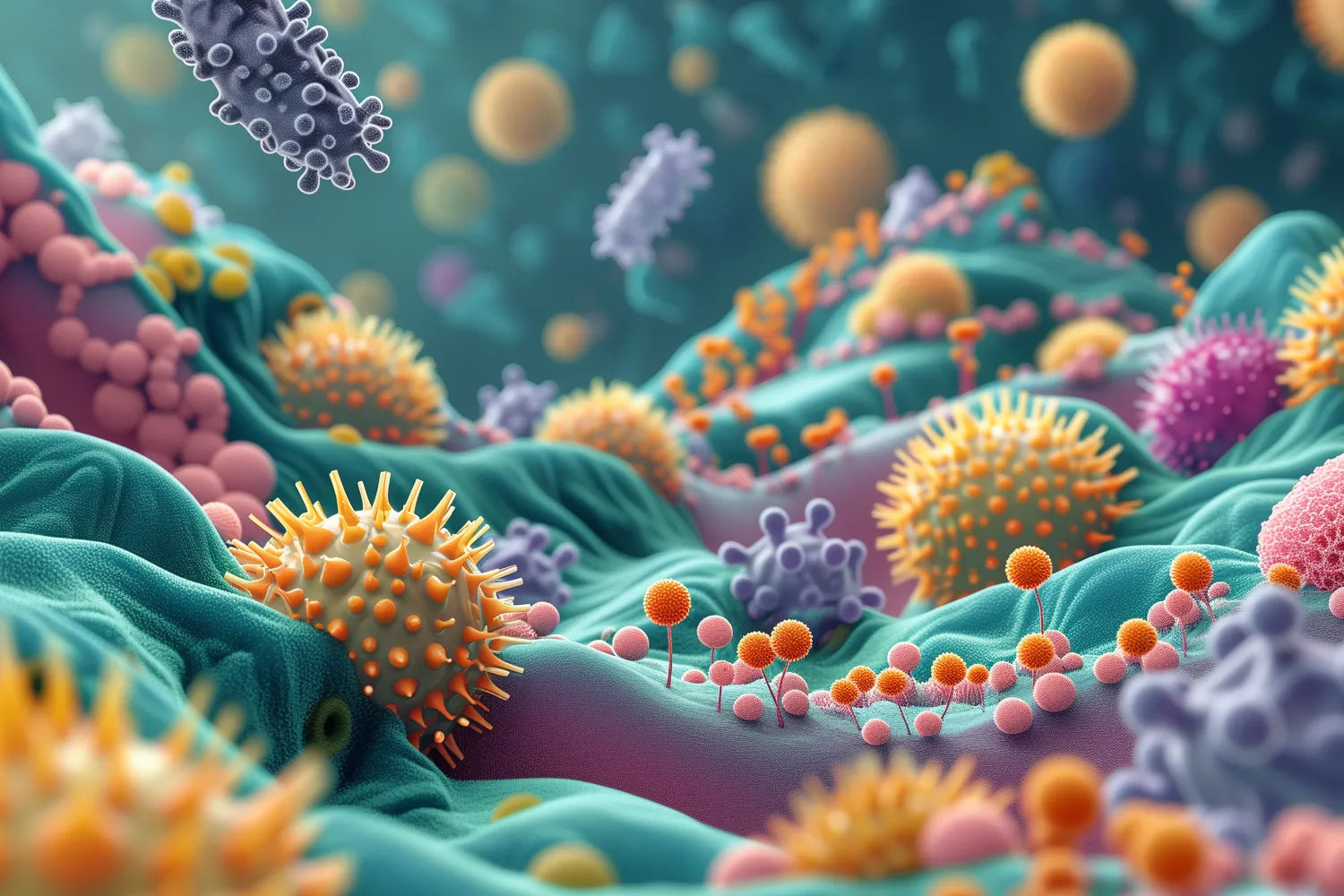
Dr. Eric Venn-Watson’s Highlights
In the United States, it’s rare to be deficient in most of the essential vitamins and nutrients needed for a healthy diet. However, with the abundance of processed convenience foods, ensuring your diet doesn’t have any gaps can become a challenge.
Although you may not notice you have a nutritional deficiency immediately, over time, symptoms can progress and cause lasting damage. Correcting nutritional deficiencies is important for maintaining your wellness and ensuring you age as healthfully as possible.
Here, we will look at five of the most common nutritional deficiencies American adults can experience, how to correct them, and other ways you can support your health with the right nutrients.
What Is a Nutritional Deficiency?
Put simply, a nutritional deficiency is a gap in your diet that is caused by a lack of a critical vitamin or mineral that your body needs to function properly. Dietary guidelines are given to advise us how much of each essential vitamin and mineral we need so that we can ensure we get enough.
There are 13 essential vitamins and minerals, and each one plays an important role in our bodies. While the body might be able to compensate for a missing nutrient for a short time, the cumulative result of not getting enough of a particular dietary ingredient results in a deficiency.
Causes of Nutritional Deficiencies
If you’re in good health, it might seem impossible to think you could have a dietary deficiency. The reasons for nutritional deficiencies, however, aren’t usually due to malnutrition, especially in Western culture.
Here are some underlying reasons why you might be experiencing nutritional gaps.
Restrictive Diets
Any time you begin a weight loss journey you’ll usually cut back on your caloric intake. Sometimes, this can result in the reduction of essential vitamins and minerals. Fad diets, especially, can eliminate entire food groups and along with them the nutritional content your body needs to survive.
Lifestyle Diets
Diets that aren’t primarily used for weight loss, such as veganism, vegetarianism, or the pegan diet, eliminate certain portions of a typical diet (like animal products), which can leave your body deficient in both micronutrients like iron or vitamin B12 and macronutrients like protein, fats, and carbohydrates.
Pregnancy
During pregnancy, the human body requires more calories and more nutrients than it does when it’s only eating for one. Particularly, folic acid and iron intake must be increased to ensure the health of the growing baby — in fact, iron deficiency is very common during pregnancy.
Underlying Medical Conditions
Diseases and the medications that treat them can also contribute to nutrient deficiencies. Crohn’s disease, IBD, and other inflammatory bowel conditions can cause the intestines to not absorb vitamins and minerals efficiently.
Medications used for diabetic blood sugar regulation, anti-seizure medications, and even antacids can also cause the body to flush out certain vitamins and minerals, or otherwise not absorb them the way it usually would.
Alcohol and Cigarettes
Alcohol abuse can cause a myriad of health issues, one of which is the malabsorption of fat, nitrogen, sodium, water, thiamine, folic acid, and vitamin B12.
Smoking cigarettes can also significantly decrease the amount of vitamin C your body is able to absorb, even if you regularly consume citrus fruits like oranges.
Five Common Nutritional Deficiencies
Even though malnutrition is rare in the United States, there is potential for deficiencies in the Standard American Diet. Here are the five most common deficiencies you could be experiencing without even knowing.
1. Vitamin D
Vitamin D plays an important role in keeping your immune system running properly and promoting healthy blood sugar levels. It’s also vital for your body’s calcium and phosphorus intake. Your body needs vitamin D to help synthesize these minerals to promote strong bones.
Vitamin D is found in foods like fatty fish (think sardines and salmon), the yolks of eggs, organ meats from beef, and fish oil. You’ll also find vitamin D in fortified products like milk and orange juice.
Your body also uses ultraviolet rays to convert cholesterol in your skin cells into vitamin D (though a lot of us don’t spend enough time outside to synthesize enough).
Vitamin D deficiency is more common than you think, especially if you have a lifestyle or live in an area where exposure to sunlight is limited.
Symptoms of vitamin D deficiency include:
- Frequent illness
- Lethargy and fatigue
- Bone pain and back pain
- Muscle weakness
- Delayed wound healing
- Bone and hair loss
- Anxiety and depression
People with kidney disease and osteoporosis are also more likely to develop vitamin D deficiency than others. A blood test can determine if you’re deficient. If you’re not deficient, it generally isn’t a good idea to take additional vitamin D, as it can create unhealthy calcium levels.
2. Vitamin B6
B6 is essential for brain development in infants and children, helps build antibodies that fight off infection, supports the health of your red blood cells, and is essential for nerve cell function and repair.
B6 is found in chicken, fish like tuna and sardines, some shellfish like oysters, legumes, bananas, and B complex-fortified foods.
Symptoms of B6 deficiency include:
- Dermatitis (a red, scaly rash that may even feel greasy to the touch)
- Numbness and tingling in the hands and feet
- Sores in and around the mouth and gums
- Pain on the tongue and inside the mouth
- Cognitive issues like confusion, irritability
- Depression
People with liver, kidney, digestive, or autoimmune diseases are most likely to be deficient in B6. Additionally, individuals who are obese, suffer from alcohol use disorder, or pregnant may also become deficient.
3. Vitamin B12
Vitamin B12 is another B vitamin that supports blood cell health, keeps nerve cells functioning properly, and promotes a stable mood. You can find B12 in meat, fish, and poultry, which makes it difficult for individuals on a vegan or vegetarian diet to get enough.
Symptoms of vitamin B12 deficiency include:
- Sore mouth and tongue
- Depression
- Confusion
- Tingling and numbness in your limbs
If you suffer from malabsorption issues, you may find yourself deficient in vitamin B12.
4. Folate
Folate is crucial for embryonic development, which is why pregnant women need to take more during pregnancy. Additionally, it’s recommended that nursing mothers extend their increased folate intake for their developing babies.
You can find folate in green, leafy vegetables like spinach, broccoli, as well as in beans. While most people won’t become deficient in folate, it may be difficult to get enough during pregnancy without a supplement.
Symptoms of a folate deficiency include:
- Lack of energy
- Feeling faint
- Pale skin
- Heart palpitations
Taking a folate supplement or increasing your daily intake of green vegetables is a good remedy for increasing your folate levels.
5. C15:0 (Pentadecanoic Acid)
If you’re scratching your head, we wouldn’t be surprised. C15:0, also known as pentadecanoic acid, is a newly discovered essential fatty acid with the potential to dramatically change the way your body ages.*
C15:0 is an odd-chain, essential, saturated fatty acid that science supports as the first essential fatty acid to have been discovered since the omegas, the essential fatty acids we find in fish oil supplements.
As we get older, our C15:0 levels naturally decline, which may require C15:0 supplementation.
Plus, as a society we have been increasingly avoiding foods rich in C15:0, like whole-fat dairy products.
C15:0 is found in trace amounts, primarily in whole-fat dairy products, but increasing your whole-fat dairy intake may not be the best solution for getting more of this powerful, essential fat. You’d have to eat a lot more of the unhealthy, even-chain, saturated fat, not to mention the calories and sugar that will come along for the ride.
Plus, as we have turned to plant-based beverages and foods, we are worsening the global deficiency of C15:0, as many of these products (think plant-based milk) are completely deficient in C15:0.
Thankfully, there’s fatty15.
Elevate your cells. Elevate your self.
Fatty15 for C15:0 Deficiency
Taking care of your cells is important. Our cells make up the tissues and organs that create the systems that run our entire bodies.
Although cellular health probably hasn’t been your main focus, you can begin to care for your cells now — it’s never too early (or late) to set yourself up for healthier aging.
Fatty15 helps aging cells in three important ways:*
-
Increased mitochondrial function. Our cells are powered by their mitochondria. As we age, the mitochondria become weaker and less efficient, which is why we get more tired as we get older. Fatty15 increases mitochondrial function by 45%, so your cells function like they did when you were younger.
-
Stronger cell membranes. The cell membranes protect your cells from external stressors. As cells age, their membranes become weak and less capable of protecting cells from damage. Fatty15 integrates into cell membranes, fortifying them and keeping them strong.
- Improved cellular signaling. Fatty15 activates special receptors all over your body called PPARs. These receptors regulate functions like mood, appetite, sleep, and even immunity. By activating these receptors, fatty15 helps improve homeostasis.
-
Stronger cell membranes. The cell membranes protect your cells from external stressors. As cells age, their membranes become weak and less capable of protecting cells from damage. Fatty15 integrates into cell membranes, fortifying them and keeping them strong.
Unlike other supplements, fatty15 contains just one ingredient: the pure, vegan-friendly version of C15:0, known as FA15™. Just 100mg a day is enough to nourish your cells with the C15:0 your body needs to thrive.*
Fill in the Gap, With Fatty15
Dietary deficiencies are more common than we think, and getting adequate nutrition is important for us to stay as healthy as possible.
Fatty15 supports your cells as you age, and provides you with an essential fat that you could be missing.
Just one capsule per day can restore your essential C15:0 levels, giving your cells a fighting chance, and allowing you to feel healthier, longer — get started with fatty15 here and see what one small yet mighty nutrient can do to support your health in big ways.
Sources:
Malnutrition and IBD | Crohn's & Colitis Foundation
Alcohol, nutrition and malabsorption|PubMed
The influence of smoking on vitamin C status in adults.|NCBI
Reviewed by Eric Venn-Watson, MD, MBA.

Eric Venn-Watson M.D.
CEO, Co-Founder
Senior Scientist, Co-Founder
Eric is a physician, U.S. Navy veteran, and Co-founder and COO of Seraphina Therapeutics. Eric served over 25 years as a Navy and Marine Corps physician, working with the special forces community to improve their health and fitness. Seraphina Therapeutics is a health and wellness company dedicated to advancing global health through the discovery of essential fatty acids and micronutrient therapeutics.
You May Also Like...
10 Foods Good for Your Liver: The Ultimate Guide
Your liver does a lot for you. If it had a voice of its own, it might ask you to eat more veggies and cut back on your Old Fashioneds. Unfortunately, the liver doesn’t receive a lot of attention until...
How To Improve Your Gut Microbiome: 6 Tips
Interested in how to improve your gut microbiome? We’ve got six tips to help your gut thrive and improve your overall digestion.


